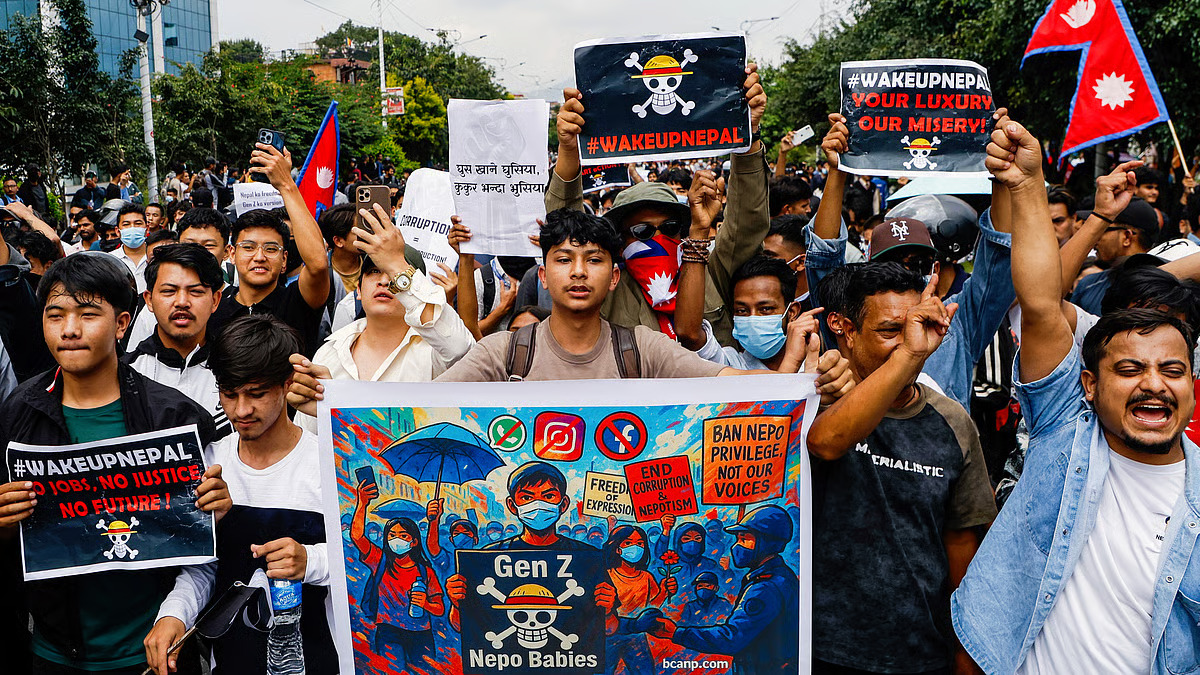
DiYES International School – Nepal is facing one of the most turbulent chapters in its modern history as anger against political privilege explodes into nationwide unrest. What began as frustration over the children of leaders enjoying luxury lifestyles while ordinary youth struggled for work has turned into a deadly confrontation. The term nepo kids, once associated with entertainment, has become a symbol of political corruption and injustice. Massive demonstrations followed the government’s controversial ban on social media, and violence soon erupted across the country. Parliament was ransacked, homes of politicians were torched, and even prisoners attempted jailbreaks during the chaos. More than 20 people, including the wife of a former prime minister, have died in the violence. This unrest forced Prime Minister KP Sharma Oli to step down, but resignation alone may not be enough to calm the fury of a generation demanding fairness, accountability, and a future beyond inherited privilege.
In Nepal, resentment toward nepotism has been simmering for years but only recently has it erupted into a generational movement. Many young citizens feel betrayed by a system that allows children of powerful politicians to thrive while others struggle to find opportunities. This disparity between privilege and hardship grew worse with widespread corruption and a lack of economic progress. When the government attempted to silence dissent by banning social media, it backfired dramatically. Instead of quelling unrest, it provided fuel for further mobilization. The viral trend nepo kid spread quickly online, turning into a rallying cry for youth who demanded change. Protests filled the streets of Kathmandu and beyond, uniting students, workers, and activists. The government underestimated the collective anger, and as clashes intensified, the fragile trust between leaders and citizens fractured completely, plunging the nation into deeper instability.
Events in Nepal escalated rapidly from demonstrations into violent confrontations that shocked the world. Security forces deployed tear gas and rubber bullets as protesters breached barricades, sparking chaos across major cities. Parliament was vandalized, and mobs stormed the homes of high-ranking politicians. In one tragic incident, the wife of a former premier lost her life during the riots. Prisoners at Dilli Bazaar jail set fires in desperation, further underlining the severity of the crisis. Amid growing pressure, Prime Minister KP Sharma Oli tendered his resignation, acknowledging the scale of public anger. However, the resignation did not stop the demonstrations, as demands went beyond leadership change. Citizens called for systemic reforms to end corruption and dismantle entrenched privilege. This period of violence marked a turning point, exposing the fragility of Nepal’s political structure and the depth of resentment among its people.
“Read more: Say Her Name 3 Times and She Appears? The Real Horror Behind Bloody Mary”
Social media has proven to be a decisive factor in shaping the protests across Nepal. The government’s ban was intended to suppress criticism but instead amplified resistance. Young people, deeply connected through digital platforms, found alternative ways to communicate, organize, and mobilize. The hashtag nepo kid spread across networks, transforming scattered discontent into a unified front. Gen Z played a crucial role, using technology to bridge urban and rural voices in a collective demand for justice. This digital activism spilled into the streets, showing how online frustration could be converted into real-world pressure. The government miscalculated the determination of young citizens who view social media not only as a tool of expression but also as a weapon against inequality. The protests highlighted a generational shift, where digital natives demand accountability and transparency with more courage and urgency than previous eras in Nepal.
The crisis in Nepal has left the nation facing uncertainty, with both immediate and long-term challenges ahead. Over 20 deaths and countless injuries have created wounds that will not heal quickly. The resignation of KP Sharma Oli has not fully addressed the root causes of unrest. Gen Z continues to push for deep reforms, insisting that the political system must serve the people rather than protect elites. International observers are watching closely as instability risks spilling beyond borders. For ordinary citizens, the hope is that sacrifices will not be in vain and that systemic change will emerge from the turmoil. The movement against nepo kids has become a defining moment, representing both anger and aspiration. Whether Nepal moves toward a reformed democracy or falls into further discord remains uncertain, but one truth has become clear: the voice of youth has forever reshaped the political landscape.
This article is sourced from hindustantimes.com and for more details you can read at diyesinternational.com
Writer: Sarah Azhari
Editor: Anisa